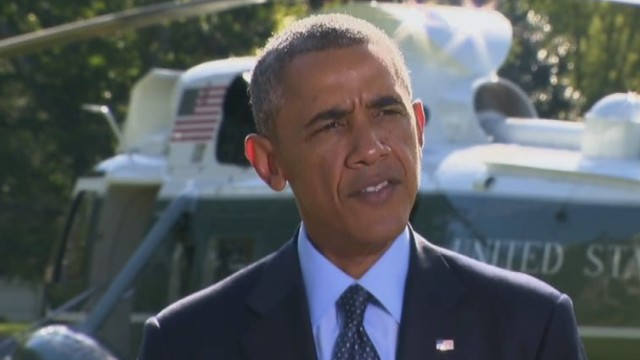Story highlights
- British Parliament -- like Belgium's -- will weigh request to participate in Iraq airstrikes
- Airstrikes have resumed in eastern Syria, a U.S. official tells CNN
- President Barack Obama urges ISIS fighters to "leave the battlefield while they can"
- U.S. Secretary of State John Kerry: U.S. airstrikes have "stopped the onslaught"
U.S. and coalition warplanes pounded ISIS positions in eastern Syria on Wednesday, targeting what a Pentagon official described as mobile oil refineries being used by the so-called Islamic State terror group to help finance its operations.
The latest round of airstrikes were aimed at cutting off money flowing to ISIS, which makes up to $2 million a day from oil produced by the mobile refineries, Navy Rear Adm. John Kirby, the Pentagon spokesman, told CNN.
Fighter jets from Saudi Arabia and the United Arab Emirates flew alongside U.S. aircraft during the operation, hitting 12 locations, Kirby said.
While the U.S. military was still assessing the outcome of the attacks, Kirby said initial indications suggest the strikes were successful.
"We are very confident we hit what we were aiming at, and we caused the damage we wanted," he said.
The airstrikes came just hours after U.S. President Barack Obama called for united action to confront ISIS, also referred to as ISIL.
"It is no exaggeration to say that humanity's future depends on us uniting against those who would divide us along fault lines of tribe or sect; race or religion," Obama said in an address before the U.N. General Assembly.
"This is not simply a matter of words. Collectively, we must take concrete steps to address the danger posed by religiously motivated fanatics, and the trends that fuel their recruitment."
China, Russia raise questions
Obama's call for action comes as questions were raised over his decision to bomb terror groups in Syria without approval from the U.N. Security Council.
Even as the Security Council adopted a resolution drawn up by the United States addressing the growing threat posed by foreign fighters, Chinese Foreign Minister Wang Yi said the world must act -- but only with U.N. approval.
Russia's foreign minister warned "against any attempt to narrow down the problem" to select groups, urging the world not to have "double standards in dividing terrorists into good terrorists and bad terrorists."
China and Russia, both permanent members of the Security Council, have blocked a number of attempts to force Syrian President Bashar al-Assad to step down as a way to bring about an end to the civil war that has since seen the rise of ISIS and other terror groups.
Still, while the U.S.-led military action in Syria hasn't been widely embraced, those involved in the international coalition in Iraq is growing.
The Dutch foreign ministry announced Wednesday that its military will contribute six F-16 fighter jets and 250 troops to carry out airstrikes and train Iraqi and Kurdish forces. Belgian Foreign Minister Didier Reynders said his country's parliament will weigh a request for six of its fighter jets to take part in the bombing campaign.
Similarly, British Prime Minister David Cameron said he's recalling Parliament Friday "to secure approval for the United Kingdom to participate in the Iraq air campaign.
"The U.N. Security Council has now received a clear request from the Iraqi government to support it in its military action against ISIL," Cameron said from U.N. headquarters in New York. "... So it is right that Britain should move to a new phase of action."
More airstrikes
The latest airstrikes against the refineries followed another round carried out overnight Tuesday into Wednesday against five more targets: four in Iraq and one in Syria, according to U.S. Central Command.
In Syria, U.S. and coalition fighter jets struck an ISIS staging area near the Iraqi border, northwest of al Qaim, damaging eight ISIS vehicles.
In Iraq, two airstrikes west of Baghdad destroyed two ISIS armed vehicles and a weapons cache. Two airstrikes southeast of the Kurdish regional capital of Irbil destroyed ISIS fighting positions.
Conceding that airstrikes so far haven't flushed out ISIS in Iraq, U.S. Secretary of State John Kerry said that American air power may nonetheless have prevented the fall of Baghdad and Irbil to the militants.
"What we've done is we've stopped the onslaught," he told CNN's Christiane Amanpour.
The airstrikes in Syria have also targeted ISIS' proclaimed capital of Raqqa.
Activist: ISIS fighters keep low profile
An activist from Raqqa, who uses the pseudonym Maher al-Ahmad, told CNN he'd gone back to the town after the airstrikes.
"It's the first time I didn't see ISIS in the streets, that I was able to walk around, because I am wanted by them," said al-Ahmad, who moves between Raqqa and Turkey's Gaziantep province.
He said people who were there during the strikes described them as feeling like earthquakes.
Some 20 to 25 vehicles filled with ISIS fighters, including people he believes were senior leadership because of the level of security around them, left the city within hours of the attacks, the activist said.
After keeping a low profile during the day, the ISIS fighters were out in the streets again by Tuesday evening but in lower numbers than usual, he said.
ISIS fighters began moving into the homes of civilians in the past two to three weeks, al-Ahmad said, raising fears that the civilians may be used as human shields or fall victim to future airstrikes.
Hassan al-Halabi, an activist from Aleppo, voiced similar fears, saying residents there have two main concerns about upcoming strikes in Syria.
"The first is that they are afraid of having civilian casualties because ISIS members and fighters are among civilians," al-Halabi said.
"And the second concern is that what will happen after that? Who will replace ISIS, especially that the regime is ready to take control of ISIS' areas?"

















